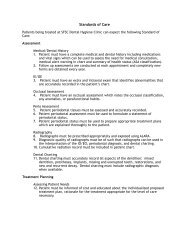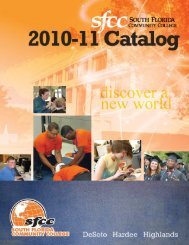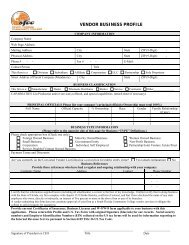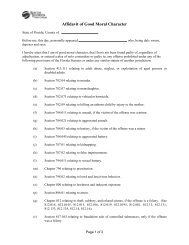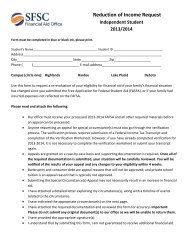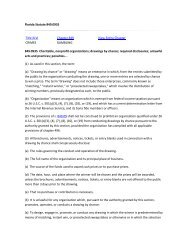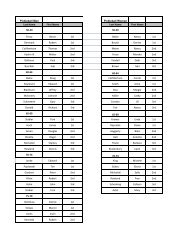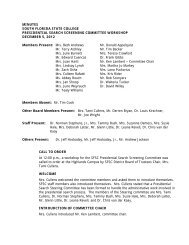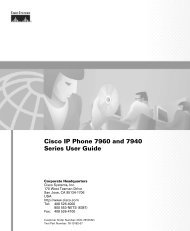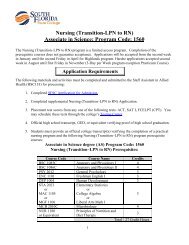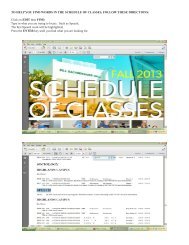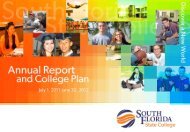Training programs are required of staff to increase their job safety and proficiency. Examples include:CPR, first aid, fire extinguisher, golf cart safety, bio-medical waste handling, electrical safety, andhazardous material awareness training. In addition, staff are encouraged to stay vigilant for safetyhazards. Once a hazard is identified, staff will isolate the hazard/area and ensure that a corrective actionhas been initiated to effectively and efficiently resolve the concern. The incident is then documented andshared with others to minimize future risk.Emergency ProceduresThe college has a standing institutional committee, the Emergency Response Team, which canassemble quickly and assist in the management of a wide diversity of emergencies. The team iscomposed of trained key leaders from all areas of the college. To aid in emergencies, the college hasdeveloped an Emergency Response Plan. To communicate SFCC’s emergency information to thecampus community, each campus and center location are equipped with Internet Protocol (IP) phonesand a software program which allows for the broadcast of targeted text and voice announcements at thefacility, campus, or college-wide level.To ensure the campus community knows the correct procedure for reporting an emergency, instructionshave been posted in the Employee Safety Manual, Student Handbook, Employee Handbook,Faculty Handbook, Adjunct Faculty Handbook, and on the college Web site. “Panther Phones”have been installed in highly populated building areas. These phones are easy to access, free, and allowanyone to place a local call, 911 call, or a direct call to Security. Additionally, call boxes are strategicallypositioned in the parking lots for individuals who need emergency assistance or access to lockedfacilities.Security and Maintenance staff are trained on the locations of critical utility switches, cut-offs, and shutdown valves enabling them to quickly isolate a problem. Each employee carries a UHF radio; keypersonnel, including all Security staff, have radios equipped with telephone key pads for 911 access.Access/key control to campus facilities is carefully monitored using interchangeable cores and amaster key system at each campus/center. Keys are made and issued by designated Maintenancepersonnel only after the proper authorization is obtained from an employee’s supervisor. Individualswithout key privileges must notify Security to gain access to or within a facility. Exterior key accessrequires approval of the VPAS.SFCC participates in vulnerability assessment surveys with the <strong>Florida</strong> Department of Law Enforcementand planning exercises with local law enforcement agencies. The survey contains emergency contactinformation, physical descriptions of campus facilities, and safety and security infrastructure features.The planning exercises vary from active shooter scenarios to hazardous chemical spills. Building floorplans, pictures of main entrances, and other data are updated annually and submitted to local sheriff’soffice and fire departments to assist with an emergency response.Disaster Evacuation, Mitigation, and RecoverySFCC Administrative Procedure 7032 provides a plan for the safe evacuation of students, personnel,and visitors in case of an emergency. Egress maps are posted in all classrooms to aid in emergencyevacuations. If the campus is evacuated, Security and Maintenance staff are responsible for maintainingthe safety and physical integrity of the campus. Communication among support staff is typicallyperformed by using UHF radios. In the event of a disruption in power service, critical areas have beenequipped with generator back up. Included in these critical areas are our Information Technology (IT)Department servers, the phone distribution panel, and radio repeaters. The previously noted EmergencyResponse Plan establishes the guidelines for disaster mitigation and recovery.The safety of students, staff, and faculty is the core of emergency and disaster planning. Preservation ofproperty is secondary. Students and nonessential personnel will be directed to leave the campus in theevent of a large scale emergency. The President, or his designee, will make the final decision regarding<strong>South</strong> <strong>Florida</strong> Community College Page 175 / 202emergency procedures to be followed.Health and Safety Inspections
The safety of students, staff, and faculty is the core of emergency and disaster planning. Preservation ofproperty is secondary. Students and nonessential personnel will be directed to leave the campus in theevent of a large scale emergency. The President, or his designee, will make the final decision regardingemergency procedures to be followed.Health and Safety InspectionsVarious health and safety inspections are conducted on campus by outside agencies. These inspectionsinclude bi-annual bleacher inspections, annual fire escape inspections, annual inspection and testing offume and kitchen hood systems, monthly inspection of fire extinguishers, evacuation chairs,AED's, eye wash/shower stations, annual inspections of sprinkler systems and fire alarms, annualbackflow preventer inspections, annual water quality testing, and monthly food service programinspections. Additionally, comprehensive annual fire safety inspections are performed by each localjurisdiction in conjunction with the Annual Comprehensive Safety Inspection <strong>Report</strong>. Results ofthese inspections are carefully reviewed by Maintenance, Security, and the Risk Management Coordinator,and work orders are developed and submitted to the appropriate departments to correct discovereddeficiencies. The report of deficiencies and corrections is annually presented to the SFCC District Boardof Trustees (DBOT) and submitted to the <strong>Florida</strong> <strong>State</strong> Fire Marshall's Office for review.Procedures for Hazardous Material and Environmental ProtectionSFCC complies with all environmental and occupational laws. The Risk Management Coordinator enforcesthe proper handling, use, and disposal of hazardous material. All known asbestos on each campus,center, and site has been eliminated or encapsulated based on asbestos survey results. Mercury in themedical technology area has been eliminated. SFCC uses only <strong>Florida</strong> Department of EnvironmentProtection registered waste transports for removing hazardous waste. Waste manifests are used totrack all shipments and are kept in the various departments which generate the waste. The RiskManagement Coordinator’s office maintains a copy of all regulated waste disposal manifests and monitorsthese documents to ensure the college remains in its regulatory compliance class. To ensure chemicalsafety and employee awareness, SFCC has developed a Hazard Communication Plan. This plan isreviewed and updated annually by the college’s Safety and Security Committee. The <strong>Florida</strong> Right toKnow law requires hazardous materials information to be posted, and the college is in compliance. TheMaterial Safety Data Sheets (MSDS) for products used within each program are readily available tothose seeking information.Bio-hazardous/medical waste generated in our allied health programs is collected and disposed of by a<strong>Florida</strong> Department of Health registered biomedical waste transporter. All biomedical waste manifests aremaintained in the office of the Associate Dean of Allied Health. To ensure safety, the college hasdeveloped a Bio-Medical Waste Operating Plan for each of its specific campus sites that generateinfectious waste. Students and staff receive annual site specific training on each operating plan. Allfacilities are permitted by the <strong>Florida</strong> Department of Health and regularly inspected to ensureoperational compliance.If the generated wastes are recyclable, the college seeks cost effective means to reclaim the waste.Currently, SFCC recycles e-waste, paper, fluorescent bulbs, ballasts, used oils and fuels, batteries,cooking oil, and antifreeze. Landscaping debris and grass clippings are composted on site to lighten theload on our local landfill.Occupational Regulatory <strong>Compliance</strong>The Risk Management Coordinator and area faculty, program managers, and directors share theresponsibility for occupational safety. The <strong>Florida</strong> College System Risk Management Consortium(FCSRMC) provides workers' compensation and other insurance needs and mandates appropriate trainingand procedures. Part of the annual risk management inspection is to document that appropriate OSHArequirements <strong>South</strong> <strong>Florida</strong> Community are in College place and to ensure that staff are following guidelines. Staff have worked Page 176 / 202cooperatively with the <strong>Florida</strong> Department of Education to bring staff training programs directly to thecollege, and such training includes Basic Electrical Safety, Golf Cart/Utility Vehicle Safety, Lock Out Tag
- Page 2 and 3:
Compliance Report - South Florida C
- Page 4 and 5:
2.1Degree-granting AuthorityThe ins
- Page 6 and 7:
County. He is a chiropractic physic
- Page 8 and 9:
Monthly Financial Report for June 2
- Page 10 and 11:
(DBOT) Policy 1.02.The college miss
- Page 12 and 13:
Institutional effectiveness is eval
- Page 14 and 15:
and determined to use the Integrate
- Page 16 and 17:
A number of planning processes take
- Page 18 and 19:
Trustees | Budget Workshop 2010-201
- Page 20 and 21:
SFCC Quick Facts, Web SiteStudent S
- Page 22 and 23:
SFCC College Catalog 2010-2011 (A.A
- Page 24 and 25:
Statewide Course Numbering SystemSt
- Page 26 and 27:
technology; understand that accurat
- Page 28 and 29:
SFCC College Catalog 2010-2011, pp.
- Page 30 and 31:
Faculty Roster Form2.8FacultyThe nu
- Page 32 and 33:
SFCC Administrative Procedure 5226
- Page 34 and 35:
faculty roster offered in support o
- Page 36 and 37:
Library Owned Collections and Resou
- Page 38 and 39:
Florida College System through a st
- Page 40 and 41:
Student Opinion Survey, p. 6Weeding
- Page 42 and 43:
eceive assistance in goal setting a
- Page 44 and 45:
Testing CenterTesting Report 2009-2
- Page 46 and 47:
independent auditors found that fin
- Page 48 and 49:
2.11.2Annual Financial Report FYE 2
- Page 50 and 51:
Trustees | Budget Workshop 2009-201
- Page 52 and 53:
Space Inventory August 2010Technolo
- Page 54 and 55:
Proposed 2009 Changes to Mission, V
- Page 56 and 57:
Presidential Search PamphletSBE Rul
- Page 58 and 59:
SBE RuleSBE Rule 6A-14.0261, Genera
- Page 60 and 61:
to the Vice President for Administr
- Page 62 and 63:
Delegation of Operational ControlWi
- Page 64 and 65:
SFCC Foundation Bylaws, PurposeSFCC
- Page 66 and 67:
policies ensure that equal opportun
- Page 68 and 69:
FS 112.313, Standards of Conduct fo
- Page 70 and 71:
Administrative | Administrative Pro
- Page 72 and 73:
Academic and Administrative Officer
- Page 74 and 75:
Administrative | Employee HandbookA
- Page 76 and 77:
FS 1012.86, Community College Emplo
- Page 78 and 79:
DBOT Policy 2.06, General Powers, D
- Page 80 and 81:
DBOT Policy 1.14 mandates that all
- Page 82 and 83:
Plan (UAP) and/or budget requests f
- Page 84 and 85:
Arts and Sciences:EducationalProgra
- Page 86 and 87:
Community/Public APA 2008-09 APA 20
- Page 88 and 89:
2008-09 APA Financial Aid2008-09 AP
- Page 90 and 91:
Program ProfileSFCC Administrative
- Page 92 and 93:
Phlebotomy ProgramPresident's Counc
- Page 94 and 95:
Hardee County Economic Development
- Page 96 and 97:
SFCC College Catalog 2010-2011, pp.
- Page 98 and 99:
SFCC Administrative Procedure 3113,
- Page 100 and 101:
Credit is also awarded through Coop
- Page 102 and 103:
compliance with comprehensive requi
- Page 104 and 105:
through testing services to assure
- Page 106 and 107:
• Analyzes data within department
- Page 108 and 109:
SEI Survey Form w-LabSyllabus Templ
- Page 110 and 111:
SFCC College Catalog 2010-2011, pp.
- Page 112 and 113:
issues brought before the committee
- Page 114 and 115:
that can be used as portables in va
- Page 116 and 117:
with a rich and flexible set of cou
- Page 118 and 119:
Our college liaison for special nee
- Page 120 and 121:
SourcesCommittee Handbook 2010-2011
- Page 122 and 123:
Technology Usage GuideUser Profile
- Page 124 and 125:
General Education Outcome #3: Stude
- Page 126 and 127:
the role that general education pla
- Page 128 and 129: SFCC College Catalog 2010-2011, p.
- Page 130 and 131: All courses taught at SFCC are part
- Page 132 and 133: Syllabus: PhlebotomyA.A.S. Degree P
- Page 134 and 135: Department staff engage with the ne
- Page 136 and 137: conference. Completed evaluation in
- Page 138 and 139: SFCC Administrative Procedure 5011
- Page 140 and 141: Strategic Plan 2009-2014, p. 13Welc
- Page 142 and 143: Faculty Handbook, p. 51SFCC Adminis
- Page 144 and 145: Faculty Handbook, pp. 42-49Faculty
- Page 146 and 147: Table 3.8.1-2: Student Opinion Surv
- Page 148 and 149: Student Opinion Survey 2007-08Stude
- Page 150 and 151: My overall impression of thissessio
- Page 152 and 153: Library Information Network and Coo
- Page 154 and 155: South Florida Community College (SF
- Page 156 and 157: Student Services | SFCC College Cat
- Page 158 and 159: catastrophic failure or becomes irr
- Page 160 and 161: Technology Support ManualTechnology
- Page 162 and 163: A generally recognized indicator of
- Page 164 and 165: FS 1011.84, Procedure for Determini
- Page 166 and 167: Financial Audit FYE 2008Financial A
- Page 168 and 169: FS 11.45, Definition; Duties; Autho
- Page 170 and 171: Surplus or excess daily funds earn
- Page 172 and 173: • requesting or coordinating the
- Page 174 and 175: Finance | State of Florida Accounti
- Page 176 and 177: 2009-2010 FCSRMC Primary CoverageCo
- Page 180 and 181: esponsibility for occupational safe
- Page 182 and 183: Training Records, BiomedicalWaste M
- Page 184 and 185: The August 2010 Employee Satisfacti
- Page 186 and 187: Agri-business Specialization (A.A.S
- Page 188 and 189: SACS Approval for Distance Learning
- Page 190 and 191: Classroom Complex (Building B). Inc
- Page 192 and 193: Spring 2010 N 3651 2445 1285 465 87
- Page 194 and 195: Three Year Course Review for Applie
- Page 196 and 197: SFCC College Catalog 2010-2011, pp.
- Page 198 and 199: Student Services | Schedule of Clas
- Page 200 and 201: SFCC College Catalog 2010-2011, pp.
- Page 202 and 203: Student Services | SFCC College Cat
- Page 204 and 205: Student Services | Student Handbook



